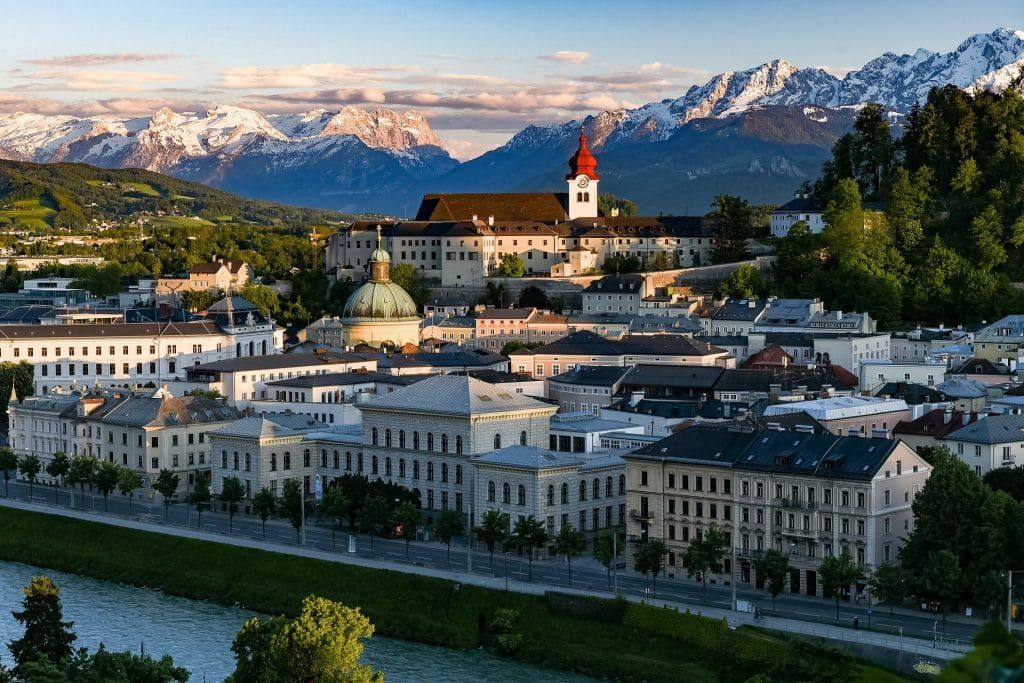Austria escaped crisis by declaring neutrality. Ukraine could follow that lead.
By Thomas Shea, Kateryna Pavlova | February 7, 2022
 Salzburg, Austria. Credit: Jorge Franganillo. Accessed via Wikipedia. CC BY 2.0.
Salzburg, Austria. Credit: Jorge Franganillo. Accessed via Wikipedia. CC BY 2.0.
At the end of World War II, Austria was occupied by France, the United Kingdom, the United States, and the Soviet Union. It might have remained divided like Germany. Instead, Austria and the four powers agreed to Austrian neutrality in 1955, which has proved remarkably successful. Today, Vienna hosts well-respected international organizations like the United Nations and the Organization of Petroleum Exporting Countries. The city was deemed the “most livable” for 10 years running on a survey that compared world cities on political, social and economic climate, medical care, education, and infrastructure conditions.
As Russia bears down on Ukraine, Austria’s experience warrants examination. Could Ukraine follow Austria’s lead to resolve the current crisis? To be sure, the circumstances of post-World War II Austria differ from the current moment. In 1955, Austrians were defeated, disarmed, and desperate to recover. By then, the Soviet Union, the United Kingdom, and the United States possessed nuclear weapons, and Cold War tensions were palpable. Today, Ukraine is besieged by Russia but strengthened by support from Western military powers. Ukrainian citizens are desperately preparing—for what? No one knows, given the uncertain course of the current crisis.
Would Ukrainian citizens accept neutrality? The Ukrainian Soviet Socialist Republic was founded in 1922 and, following the end of World War II, became an integral part of the Soviet Union’s nuclear force structure.
But many Ukrainians wanted a different future. Months before the collapse of the Soviet Union, the Ukrainian Soviet Socialist Republic declared “its intention of becoming a permanently neutral state that does not participate in military blocs and adheres to three nuclear free principles: to accept, to produce and to purchase no nuclear weapons.” The declaration made clear that it was “the basis for a new constitution and laws of Ukraine and determines the positions of the Republic for the purpose of international agreements.”
When the Soviet Union collapsed in 1991, Ukraine seized the opportunity to declare its independence. Over 4,000 Soviet nuclear weapons were orphaned in Ukraine, making it the third-largest nuclear power in the world at the time. Some Ukrainians wanted to keep some of those weapons for security. But Russia, the United States, and the United Kingdom exerted pressure to relinquish the arsenal, and newly independent Ukraine caved to their wishes. The orphaned weapons were returned to Russia or destroyed with Russian assistance under the watchful eye of US and UK military observers.
In 1994, Ukraine, Russia, the United States, and the United Kingdom signed the Budapest Memorandum in which they reaffirmed their commitments to respect the independence, sovereignty, and existing borders of Ukraine. President Putin refused to be bound by what former Russian president Yeltsin had accepted. Instead, he supported insurrections and brazenly seized Ukrainian territory, while neither the United States nor the United Kingdom were prepared to act on their Budapest Memorandum commitments.
What should Ukrainian neutrality include? Any bid for Ukrainian neutrality must be mindful of Ukraine’s history and relevant geopolitics. Russia, France, the United Kingdom, and the United States are nuclear weapon states of the Nuclear Non-Proliferation Treaty. They have permanent seats on the UN Security Council and veto rights over any of its deliberations. This means that these four countries would be central to Ukrainian stability, energy security, and peace.
Ukraine’s borders will need to be defined, including those with Crimea and Moldavia. Some pro-Russian and pro-European Ukrainian citizens will need resettlement options.
No foreign military forces should be allowed on Ukrainian territory, and the military forces of neighboring countries should be deployed away from the borders. Ukraine’s military personnel and weaponry should be limited to that which is necessary to address its domestic security concerns: assist in national emergencies and possibly support UN peace keeping missions.
A neutral Ukraine could join the European Union (like Austria) but not NATO.
Ukraine’s energy security must also be robust and reliable. Currently, Ukraine has 15 operating nuclear power reactors on its territory, together with 30,000 kilometers of gas and oil pipelines. Ukraine should have adequate energy reserves to meet all of its domestic energy requirements for at least one year. Also, much of the Russian gas and oil that Europe depends upon today is shipped through Ukraine. For this reason, provisions for Ukrainian neutrality must guarantee its energy sources and fuel transshipment rights.
How might Ukrainian neutrality succeed? As Austria drafted its post-war constitution, it secured commitments from the four powers to protect its neutrality. When all signed the Austrian State Treaty, Austria set a path toward stability and peace.
Ukraine should draft a new constitution that proclaims perpetual neutrality and outlines the rights and obligations of all Ukrainian citizens.
Similar to the Austrian State Treaty, Ukraine will need a regional framework treaty in which all relevant parties commit to support and defend Ukrainian neutrality. In this treaty, Ukraine, Belarus, Russia, NATO, the European Union, and the United States should articulate their intention to protect the sovereign rights of Ukraine for as long as its people honor their constitution. All countries bordering Ukraine should also agree to this framework. Other countries wishing to demonstrate support should be encouraged to join as well.
This regional framework treaty should establish a commission to monitor compliance. In the event of non-compliance, the commission could call an emergency conference of the treaty’s parties and refer breaches to the UN Security Council for resolution. That said, no Security Council deliberations on Ukraine should be subject to any veto.
Both the new Ukrainian constitution and the regional framework treaty must be resilient and durable to work. If so, Ukraine would have a chance—despite its troubled history and despite concerning geopolitics—to find peace, security, and prosperity.
Together, we make the world safer.
The Bulletin elevates expert voices above the noise. But as an independent nonprofit organization, our operations depend on the support of readers like you. Help us continue to deliver quality journalism that holds leaders accountable. Your support of our work at any level is important. In return, we promise our coverage will be understandable, influential, vigilant, solution-oriented, and fair-minded. Together we can make a difference.
Keywords: Austria, Budapest memorandum, Russia, Ukraine, neutrality, nuclear risk, nuclear weapons, women
Topics: Nuclear Risk, Nuclear Weapons

















Another example of neutral country is Switzerland, which was constrained to this solution in the Vienna congress (1815) not only because of internal tensions, but also because the surrounding and opposed larger powers like France and the Austro-Hungarian empire has interest to have a neutral Switzerland.
Probably the best article I have read about a path forward for Ukraine. Bravo!
Also Finland is a successful example of neutral Country. And I fully agree that it would be an advantage for all the interested parties to have a neutral partner to do business with.
Unfortunately the neutral status for Ukraine is probably not seen with favor by NATO as it will prevent further military aid to Ukraine and will put an end to the valuable weapon business.
Finland is a good recent example. 1948-1990. It was guaranteed by all the powers, as the examples sited below. But it had an additional dimension of domestic power-sharing, which Austria did in a different form. This is the obvious solution, but it has been made more difficult to achieve by the ham-handed Putin takeover of the Crimea. This cannot be accepted according to the Helsinki agreements-no forceful change of frontiers, but no doubt arrangements acceptable to all sides could be found. The bottom line for the Ukraine is that any deal must be consented to by a large majority; the… Read more »
Thanks for this. However, I feel it fails to address what happens when a new leader refuses to abide by previous agreements – and there have been enough examples recently on any part of this single world.
On the 20th of January, we endorsed this solution to the crisis by sharing with the Canadian minister of Foreign affairs Mélanie Joly the following article: http://www.artistespourlapaix.org/?p=21379
The only beneficiary of the concept of Ukraine’s “neutrality” is Russia as it will simplify military operations aimed at further seizing Ukraine’s territories. For some reason authors do not recall the fact that Ukraine has officially declared neutrality in 2010 and has been neutral till the end of 2014 while Russia has been developing and implementing invasion plans, having seized Crimea directly and some eastern districts via effectively controlled proxies, killing thousands of Ukrainian soldiers and civilians. Since then no guarantees or documents from Russia may be trusted. So, now the only thing that may prevent the big war is… Read more »
The naivety embodied in this article is stratospheric. Neutrality may or may not be desirable for a country, but declared neutrality in itself has never held an attacker at bay, never. Swiss arms deterred Germany because the risk-return in 40-45 was bad. Had Germany won, Switzerland would have been part of the Reich within 5 years without a shot being fired. And Swedish neutrality was of no greater value as a deterrent either. Sweden provided Germany unrestricted supplies of iron and nickel without Germany sending occupation troops. Had Sweden refused, it would have been immediately invaded and it too would… Read more »
Perhaps you missed the regional framework treaty noted in the article. Would that work? Possibly, if all of the players want such an outcome. Austrian neutrality as I understand it, was an Austrian idea that the occupying forces bought into, to send them all home. Austria works. Could Ukraine?
Comparison with Austria is completely wrong, because current situation is absolutely different – Ukraine was already neutral at the moment when Russia started aggression.
There are also a couple of strange moments in the article: